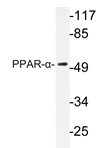PPAR alpha (PPARA) Rabbit Polyclonal Antibody
Other products for "PPAR alpha"
Specifications
| Product Data | |
| Applications | IF, WB |
| Recommended Dilution | Western blot: 1/500-1/1000. Immunoflourescence: 1/50-1/200. |
| Reactivities | Human, Mouse, Rat |
| Host | Rabbit |
| Clonality | Polyclonal |
| Specificity | This antibody detects endogenous levels of PPAR-α protein. |
| Formulation | Phosphate buffered saline (PBS) with 0.05% sodium azide, approx. pH 7.2 State: Aff - Purified State: Liquid purified Ig fraction |
| Concentration | 1.0 mg/ml |
| Purification | Affinity-chromatography using epitope-specific immunogen; purity is > 95% (by SDS-PAGE) |
| Conjugation | Unconjugated |
| Storage | Store undiluted at 2-8°C for one month or (in aliquots) at -20°C for longer. |
| Stability | Shelf life: one year from despatch. |
| Predicted Protein Size | ~ 52 kDa |
| Gene Name | peroxisome proliferator activated receptor alpha |
| Database Link | |
| Background | Peroxisome proliferators are nongenotoxic carcinogens which are purported to exert their effect on cells through their interaction with members of the nuclear hormone receptor family, termed Peroxisome Proliferator Activated Receptors (PPARs). Nuclear hormone receptors are ligand dependent intracellular proteins that stimulate transcription of specific genes by binding to specific DNA sequences following activation by the appropriate ligand. Studies indicate that PPARs are activated by peroxisome proliferators such as clofibric acid, nafenopin, and WY-14,643, as well as by some fatty acids. It has also been shown that PPARs can induce transcription of acyl coenzyme A oxidase and cytochrome P450 A6 (CYP450 A6) through interaction with specific response elements. PPAR alpha is activated by free fatty acids including linoleic, arachidonic, and oleic acids. Induction of peroxisomes by this mechanism leads to a reduction in blood triglyceride levels. PPAR alpha is expressed mainly in skeletal muscle, heart, liver, and kidney and is thought to regulate many genes involved in the beta-oxidation of fatty acids. Activation of rat liver PPAR alpha has been shown to suppress hepatocyte apoptosis. PPAR alph,a like several other nuclear hormone receptors, heterodimerizes with retinoic X receptor (RXR) alpha to form a transcriptionally competent complex. |
| Synonyms | NR1C1, PPAR, PPARA |
| Reference Data | |
| Protein Families | Druggable Genome, Nuclear Hormone Receptor, Transcription Factors |
| Protein Pathways | Adipocytokine signaling pathway, PPAR signaling pathway |
Documents
| Product Manuals |
| FAQs |
| SDS |
{0} Product Review(s)
0 Product Review(s)
Submit review
Be the first one to submit a review
Product Citations
*Delivery time may vary from web posted schedule. Occasional delays may occur due to unforeseen
complexities in the preparation of your product. International customers may expect an additional 1-2 weeks
in shipping.






























































































































































































































































 Germany
Germany
 Japan
Japan
 United Kingdom
United Kingdom
 China
China



